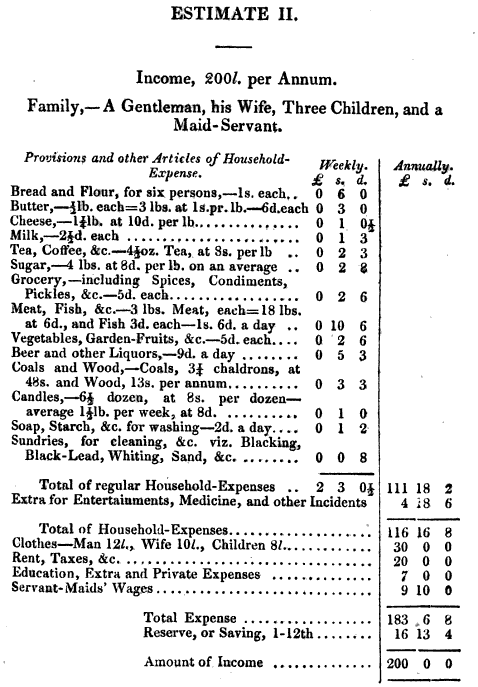The following lists of incomes and expenditures can be found in A New System of Practical Domestic Economy, published in London in 1823. The book contains more estimates than the ones below. I removed the estimates that I felt were redundant thus upsetting the numbering sequences. Sorry.
The estimates increase per annum income. The final list is for an income of 5,000 pounds per year. That was about Mr. Bingley’s income in Pride and Prejudice. Mr. Bennet’s was 2,000 pounds.
*I created a new and exciting (not!) page explaining British money and coins in the Regency and Victorian era.
Enjoy!
“Respecting Bread, which is the principal‘article of consumption in families of the middle classes, we have founded our calculation on the present price of sound household bread in London—namely, from seven farthings to two pence farthing per pound: but this is more than the average price in the country. There, too, barley, rye, or oaten bread, is generally eaten in such families, many of whom, also, bake their own bread, which is a considerable saving; so that our Estimates may be too high for the country, which, however, is an error on the right side. But respecting this and other articles of food, we have made it a point to be as correct, and as generally applicable, as it is possible to be.
As to the quantity of bread stated, we consider it as fully sufficient The two adults cannot eat more than six pounds each, per week, and we consider the three children as consuming as much as their parents—that is, six pounds more; but should ‘ not this, in any case, be enough, as the income will not afford more, recourse must be had to potatoes, rice, oatmeal, and other wholesome and nutritive articles of food for the children, which will save bread, and should be constantly given to them, as proper and economical substitutes for this and other expensive articles of diet.
It is better to buy large loaves than small ones ; and the loaf should not be out till it is one day old.
The quantity of butcher’s meat given here is very low, and it is necessarily so; but at all places on or near the sea-coast, fish may be bought at a cheap rate, to supply its place. Even in London, very frequently, mackerel, herrings, cod, flounders, and other kinds of fish, may be had cheaper than butcher’s meat. The price of good beef and mutton is now, from five pence to seven pence per pound, for common joints,—the average is about six pence; inferior parts cheaper.”
“The prudent housewife will readily learn to substitute articles of comparatively less prices for those of greater expense, which, notwithstanding, will be no less wholesome and nourishing, especially for children. Thus, potatoes, rice, Ste. as already observed, will save bread. Treacle is a good substitute for butter, or sugar, for children, and milk and water instead of tea or beer. Oatmeal-gruel, or the different kinds of porridge, make a good breakfast for them; and Scotch barley, stewed in the liquor of boiled meat, will, occasionally, make them an excellent meal. Fish may, sometimes, advantageously supply the place of butcher’s meat. Potatoes are the cheapest and best of all vegetables that can be eaten in a numerous family. Peat, turf, coke, or wood, in local situations, will save coals. Oil saves candles; and so of many other articles, that will readily be suggested to the mind of an economical manager.”
“It is evident that though the wages of an assistant or journeyman-tradesman be nominally 5s, 6d. a day or 33s. a week..”
“A Clerk or other person, with such a family, having an income of eighty guineas a year, by acquiring an habit of living regularly, might live comfortably.”
“He possesses a permanent income of 125l. a year; and he rents a neat little house, of six rooms, in the vicinity of London, the rent of which, with the taxes, &c. cost him about 33l. 10s. a year; out of which he receives 20l. a year for the first floor, and the occasional use of the kitchen; he consequently, stands at about 13l. 10s. a year, or 5s. 3d. a week, for rent. His wife, knowing that a small income will not admit of irregularity or inadvertency, purchases all the unperishable articles of necessary consumption, in quantities, at wholesale prices, and as she knows how long they ought to last, she manages them accordingly. Candles and soap are laid in, for the year, in the summer time, when cheapest; and these articles, when kept in a. dry place, become hard, fitter for use, and go farther. By getting a neighbour to join in the purchase of coals, they lay in their year’s stock, consisting of a room, or five chaldrons, about August, when they are cheapest; and thus they get the ingrain, or three sacks over, upon that quantity. Half a ton of potatoes laid in in October, and kept in a dry place, properly secured from the frost, serve the family till potatoes come next year. Traces of onions are bought in October, and hung up in a dry place to serve the winter. A firkin of good table-beer, at 6s. serves the family, as their beverage at meals, for about a month, besides which the parents occasionally drink porter. All the lesser branches of domestic arrangement are managed with the same steady view to regularity and economy; and thus they live happily, and are much respected.”



























Wow
this is very useful. thank you!
I was amused to notice that the household with a yearly income of about 100 pounds is headed by a “Man,” but when the income reaches 150 pounds per annum the head of the house is a “Gentleman”~
Wow. I didn’t even notice. Good catch!